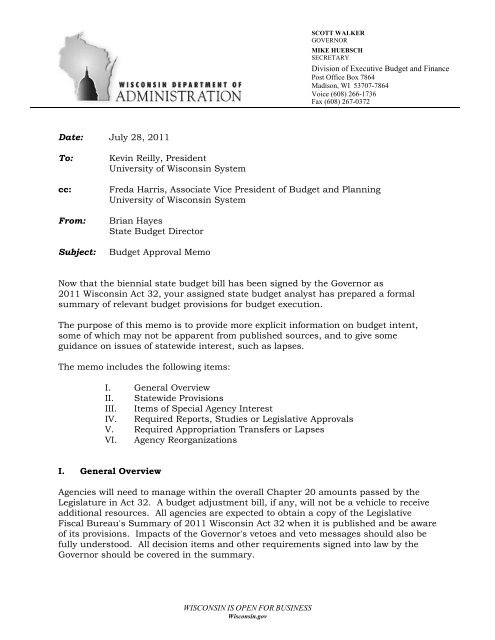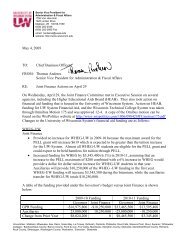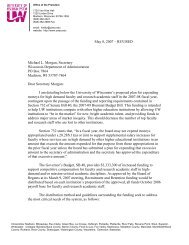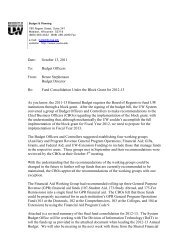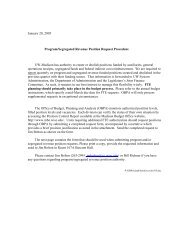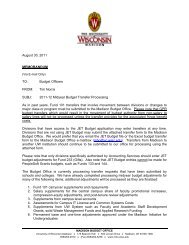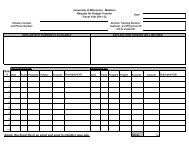Budget Approval Memo from State Budget Director - Madison ...
Budget Approval Memo from State Budget Director - Madison ...
Budget Approval Memo from State Budget Director - Madison ...
Create successful ePaper yourself
Turn your PDF publications into a flip-book with our unique Google optimized e-Paper software.
SCOTT WALKER<br />
GOVERNOR<br />
MIKE HUEBSCH<br />
SECRETARY<br />
Division of Executive <strong>Budget</strong> and Finance<br />
Post Office Box 7864<br />
<strong>Madison</strong>, WI 53707-7864<br />
Voice (608) 266-1736<br />
Fax (608) 267-0372<br />
Date: July 28, 2011<br />
To:<br />
cc:<br />
From:<br />
Subject:<br />
Kevin Reilly, President<br />
University of Wisconsin System<br />
Freda Harris, Associate Vice President of <strong>Budget</strong> and Planning<br />
University of Wisconsin System<br />
Brian Hayes<br />
<strong>State</strong> <strong>Budget</strong> <strong>Director</strong><br />
<strong>Budget</strong> <strong>Approval</strong> <strong>Memo</strong><br />
Now that the biennial state budget bill has been signed by the Governor as<br />
2011 Wisconsin Act 32, your assigned state budget analyst has prepared a formal<br />
summary of relevant budget provisions for budget execution.<br />
The purpose of this memo is to provide more explicit information on budget intent,<br />
some of which may not be apparent <strong>from</strong> published sources, and to give some<br />
guidance on issues of statewide interest, such as lapses.<br />
The memo includes the following items:<br />
I. General Overview<br />
II. <strong>State</strong>wide Provisions<br />
III. Items of Special Agency Interest<br />
IV. Required Reports, Studies or Legislative <strong>Approval</strong>s<br />
V. Required Appropriation Transfers or Lapses<br />
VI. Agency Reorganizations<br />
I. General Overview<br />
Agencies will need to manage within the overall Chapter 20 amounts passed by the<br />
Legislature in Act 32. A budget adjustment bill, if any, will not be a vehicle to receive<br />
additional resources. All agencies are expected to obtain a copy of the Legislative<br />
Fiscal Bureau's Summary of 2011 Wisconsin Act 32 when it is published and be aware<br />
of its provisions. Impacts of the Governor's vetoes and veto messages should also be<br />
fully understood. All decision items and other requirements signed into law by the<br />
Governor should be covered in the summary.<br />
WISCONSIN IS OPEN FOR BUSINESS<br />
Wisconsin.gov
Kevin Reilly, President<br />
Page 2<br />
July 28, 2011<br />
II.<br />
<strong>State</strong>wide Provisions<br />
The following provides a short summary of items in Act 32 that affect all or most<br />
agencies. Additional information if needed is provided in the paragraphs that follow.<br />
Summary:<br />
Compensation reserves are limited to fringe benefits and reflect a reduced level of<br />
funding.<br />
<br />
<br />
<br />
<br />
<br />
<br />
<br />
<br />
27th Pay Period – Fiscal year 2011-12 includes one additional pay period. This<br />
event occurs every 11 years to adjust for differences between the length of the<br />
fiscal year and 26 pay periods.<br />
Lapse and transfer of funds related to:<br />
o Unallocated lapse of $174.3 million <strong>from</strong> GPR and program revenue<br />
appropriations with cash balances, of which $123.2 million must occur in<br />
fiscal year 2011-12;<br />
o Program revenue lapses related to employee compensation changes,<br />
elimination of long-term vacant positions and across-the-board reductions;<br />
o GPR and PR reductions related to the 2 percent pay increase received by<br />
represented employees in June 2009.<br />
Treatment in the Position Management Information System (PMIS) of positions<br />
eliminated in the budget, including the elimination of long-term vacant positions.<br />
Ten percent across-the-board reductions to most appropriations, excluding<br />
funding for salaries and fringe benefits.<br />
Change in procurement bid threshold <strong>from</strong> $25,000 to $50,000 to be coordinated<br />
with Department of Administration <strong>State</strong> Procurement.<br />
Development of a Web site on expenditures, contracts and grants. An initial<br />
version of the Web site is now active and provides appropriation information<br />
(http://doa.wi.gov/sboexpendchoose.asp?locid=166). Other elements will be added<br />
over time.<br />
Conversion of certain classified FTE positions to unclassified status (chief legal<br />
counsel, legislative liaison, communications director).<br />
Employee compensation changes:<br />
o Increased WRS contributions will be treated as pre-tax.<br />
o Health insurance and pension contribution increases first reflected on August<br />
25th paychecks for biweekly payrolls.<br />
o Collection for union dues and union-sponsored programs such as union<br />
dental plans will stop as of the July 28th paycheck.
Kevin Reilly, President<br />
Page 3<br />
July 28, 2011<br />
o<br />
o<br />
Agency budgets have been reduced based on a full year of implementation.<br />
However, the higher employee contributions will be delayed by three pay<br />
periods in fiscal year 2011-12, so agencies should plan accordingly.<br />
2011 Wisconsin Act 10 requires that the Group Insurance Board (GIB), adopt<br />
changes to the design of the state employee health insurance plan to<br />
accomplish a reduction of 5 percent in the annual premium costs. The<br />
Department of Employee Trust Funds will provide more information on these<br />
changes over the next few months. These changes will be effective<br />
January 1, 2012.<br />
<br />
New employee changes:<br />
o 5 years vesting period for WRS eligibility<br />
o Individuals must work two-thirds of full employment for WRS eligibility<br />
Compensation Reserves<br />
The GPR compensation reserve approved by the Legislature and signed into law<br />
includes funding for supplementable 2011-13 costs of health insurance and other<br />
fringe benefit adjustments. The Legislature's $15 million reduction to the Governor's<br />
recommended level ($5 million in fiscal year 2011-12 and $10 million in fiscal year<br />
2012-13) may impact the ability of the compensation reserve to fully fund fringe<br />
benefit costs. Compensation reserve amounts <strong>from</strong> other funding sources were<br />
calculated based on health insurance and other fringe benefit adjustments as well.<br />
Agencies will not receive supplements for salary costs <strong>from</strong> any fund source and<br />
should plan accordingly.<br />
27th Pay Period<br />
The additional (27th) pay period occurs in fiscal year 2011-12. For GPR<br />
appropriations, these costs are budgeted centrally in a specific program supplement<br />
appropriation. For non-GPR appropriations, these costs should similarly be treated as<br />
nonappropriated reserves in program revenue accounts or segregated fund condition<br />
statements.<br />
Fiscal Year 2011-12 Lapses<br />
Agencies will be assigned lapse amounts related to the $174.3 million unallocated<br />
lapse in the near future. Attached is your plan for 2009-11 which you should<br />
reference when developing the plan to meet the agency's assigned target. All lapses<br />
will be processed at the end of the fiscal year as done in past biennia.<br />
Agency Position Summary and PMIS Changes Regarding Positions Eliminated in the<br />
<strong>Budget</strong><br />
Given the complexity of position changes in the budget, state budget analysts will<br />
prepare position summaries for each of their agencies. The summary will include base<br />
level FTE position totals by funding source and itemized position changes by<br />
appropriation. This summary will have been reconciled to the state budget system<br />
and will be the control document used when PMIS file maintenance adding, deleting or
Kevin Reilly, President<br />
Page 4<br />
July 28, 2011<br />
making other budget-related changes to positions is reviewed by the relevant state<br />
budget analyst. Each agency budget director will be requested to formally sign off on<br />
these summary documents. PMIS file maintenance submitted to implement budget<br />
reductions will be held until all parties have signed off on these summary documents.<br />
III. Items of Special Agency Interest<br />
Items of special interest to your agency include the following:<br />
Administrative autonomy relating to budgeting and financial management, tuition,<br />
human resources, building projects, and purchasing and procurement:<br />
1. <strong>Budget</strong>ing and financial management:<br />
a. GPR block grants: Consolidates most GPR appropriations into two<br />
appropriations. Maintains GPR appropriations for UW System<br />
Administration, <strong>State</strong> Laboratory of Hygiene, and Veterinary Diagnostic<br />
Laboratory appropriations. Requires UW System to administer proportional<br />
shares of GPR funding to campuses in the form of block grants.<br />
b. Consolidated PR appropriations: Creates four new PR appropriations<br />
including: general program operations, self-amortizing debt service, gift and<br />
non-federal grants and general fund interest for all interest earned<br />
attributable to UW System PR appropriations.<br />
2. Tuition policy:<br />
a. Limits resident undergraduate tuition to a 5.5 percent annual increase in<br />
the 2011-13 biennium; exempts differential tuition plans approved before<br />
June 1, 2011. Permanently deletes current law limitations on tuition<br />
increases. A special task force will make recommendations on future tuition<br />
flexibility.<br />
3. Human resources:<br />
a. Personnel systems: Authorizes the UW System and UW <strong>Madison</strong> to establish<br />
new personnel systems for their respective employees, subject to Joint<br />
Committee on Employment Relations (JCOER) approval. Specifies that<br />
personnel systems would include a civil service system and a grievance<br />
process. Retains civil service protections for UW classified employees with<br />
permanent status or completed probationary period as of July 1, 2013. All<br />
employees hired after July 1, 2013 would have protections, privileges and<br />
rights under new personnel systems. Transfers all UW employees <strong>from</strong> state<br />
personnel system to new personnel systems at UW System and UW <strong>Madison</strong><br />
beginning July 1, 2013.<br />
b. Supplemental pay plans: Provides that the Board of Regents and the UW<br />
<strong>Madison</strong> Chancellor may supplement state-approved pay plans for UW<br />
System employees and UW <strong>Madison</strong> employees, respectively, <strong>from</strong> available
Kevin Reilly, President<br />
Page 5<br />
July 28, 2011<br />
resources; plans must be approved by JCOER. Supplemental funding may<br />
not be requested to fund increased salary and fringe costs provided in these<br />
plans.<br />
c. Labor negotiations: Shifts collective bargaining negotiations <strong>from</strong> the Office<br />
of <strong>State</strong> Employment Relations to UW System and UW <strong>Madison</strong>. Creates<br />
bargaining units for UW System and UW <strong>Madison</strong> and establishes the Board<br />
of Regents as employer of its represented staff; and UW <strong>Madison</strong> the<br />
employer of its represented staff, effective July 1, 2013.<br />
d. Employee Benefits and Position Control: UW employees remain state<br />
employees and continue to participate in state health insurance and the<br />
Wisconsin Retirement System, but will not be counted in state position<br />
counts beginning July 1, 2013. Board of Regents will continue to report<br />
annually on created or abolished positions and continue to submit quarterly<br />
position counts to the Department of Administration (DOA).<br />
e. Position Authority: Beginning July 1, 2011, UW <strong>Madison</strong> and UW System will<br />
be able to create or abolish non-GPR funded positions. GPR-funded<br />
positions will be created or abolished by Legislature or Joint Committee on<br />
Finance (JCF) except as provided under current law, except for the<br />
UW <strong>Madison</strong>. UW <strong>Madison</strong> would be permitted to create new GPR positions<br />
under current law through approval by the Legislature or JCF.<br />
f. Dual Employment: Removes limitations on dual employment for UW System<br />
or UW Extension employees.<br />
g. Travel by UW System Employees: Board of Regents would establish travel<br />
policies and reimbursement schedules beginning July 1, 2013.<br />
4. Building Projects:<br />
a. Capital Planning: UW System building projects less than $500,000 and<br />
funded entirely with gifts and grants will not require approval by the<br />
Building Commission and would be exempt <strong>from</strong> DOA oversight and the<br />
Division of <strong>State</strong> Facilities (DSF) 4% project management fee, unless UW<br />
System chooses to use DSF services.<br />
b. Competitive Bidding Rules: Exempts building projects with costs of less than<br />
$500,000 and funded entirely with gifts and grants <strong>from</strong> current law<br />
provisions related to bidding. Requires the Board of Regents to establish<br />
rules for competitive bidding for such project.<br />
c. Gifts of Real Property: Increase the current law threshold for approval by the<br />
Building Commission of gifts of real property to the Board of Regents <strong>from</strong><br />
$30,000 to $150,000. Authorizes the Board of Regents to accept gifts of<br />
vehicles.<br />
5. Purchasing and Procurement:<br />
a. Procurement Bid Threshold: Requires DOA to delegate the authority to enter<br />
into higher education purchasing consortia directly to the Board of Regents<br />
and UW <strong>Madison</strong>. Raises bid threshold <strong>from</strong> $25,000 to $50,000. Exempts<br />
UW System and UW <strong>Madison</strong> <strong>from</strong> DOA oversight of contractual services
Kevin Reilly, President<br />
Page 6<br />
July 28, 2011<br />
including approval monitoring and periodic reviews; written justification<br />
submitted to DOA when contractual service vendors are required;<br />
requirement that OSER review contractual service contracts.<br />
b. Cost Benefit Analysis: Exempts UW System and UW <strong>Madison</strong> <strong>from</strong> cost<br />
benefit requirements for contracts and renewals greater than $25,000<br />
c. UW Reporting for Contractual Services: UW System will continue to report<br />
annually on contractual service procurements to the Governor, Joint<br />
Committee on Finance, Joint Audit Committee and Chief Clerk of each<br />
house of the legislature, as under current law.<br />
Other Provisions:<br />
6. Expands veterans fee remissions to include distance education, online, 100 percent<br />
fee funded courses, and the University of Wisconsin-<strong>Madison</strong> Executive MBA<br />
program, and increased the number of credits or semesters eligible for state tuition<br />
remissions. Federal veteran's educational assistance that covered 100 percent of a<br />
credit or semester will no longer count against the 128 credit or 8 semester state<br />
assistance limit. This provision is effective retroactively, applying to students who<br />
enrolled in the spring 2010 semester at University of Wisconsin System campuses.<br />
7. Repeals authorization for University of Wisconsin System campuses to charge<br />
resident tuition for undocumented persons, effective the first semester following<br />
the bill effective date.<br />
8. Creates a special task force on UW Restructuring and Operational Efficiencies<br />
consisting of 17 appointed members. Staffing will be provided by UW System, the<br />
Department of Administration and the Legislative Fiscal Bureau.<br />
9. Beginning June 15, 2011, prohibits the Board of Regents <strong>from</strong> committing, or<br />
allowing a UW institution, UW College campus, or UW-Extension to commit, any<br />
funds received <strong>from</strong> the National Telecommunications and Information<br />
Administration in the U.S. Department of Commerce related to the Building<br />
Community Capacity through Broadband grant to any facilities, unless the funds<br />
were committed prior to June 15, 2011, without JCF approval.<br />
IV. Required Reports, Studies or Legislative <strong>Approval</strong>s<br />
Agencies should carefully review the nonstatutory provisions in Act 32 and the<br />
Governor's veto message related to the agency's programs. This language will directly<br />
impact many projects over the next two years. These requirements for your agency<br />
include the following:<br />
1. Requires that an Accountability Report be submitted annually by the Board of<br />
Regents and UW <strong>Madison</strong> Chancellor to the Governor and the Legislature. Reports
Kevin Reilly, President<br />
Page 7<br />
July 28, 2011<br />
should include the following measures: performance, financial, access and<br />
affordability, undergraduate education, graduate and professional education,<br />
faculty, economic development, and collaboration.<br />
2. UW System Administration base reduction plan due to Secretary of DOA and to<br />
JCF by September 1, 2011 for 14-day passive review.<br />
3. Special Task Force on UW Restructuring and Operational Flexibilities report due to<br />
Senate and Assembly standing committees on higher education and JCF by<br />
January 1, 2012.<br />
4. Joint Committee on Finance approval required for: UW System employees<br />
personnel system submitted by UW System; UW <strong>Madison</strong> personnel system,<br />
submitted by UW <strong>Madison</strong> Chancellor.<br />
5. Joint Committee on Employment Relations approval required for: supplemental<br />
pay plans for UW System employees, submitted by UW System; supplemental pay<br />
plans for UW <strong>Madison</strong> employees, submitted by UW <strong>Madison</strong> Chancellor.<br />
V. Required Appropriation Transfers or Lapses<br />
Many agencies have requirements to make payments, transfers or lapses on specific<br />
dates. These should be highlighted in the Legislative Fiscal Bureau Summary of<br />
Act 32 but should, nonetheless, be verified by agencies in the documents themselves.<br />
The budget is balanced in part on these transactions, and agencies should meet all the<br />
applicable statutory deadlines governing the transactions. There are no specific<br />
requirements for the agency.<br />
In addition to any specific lapses and transfers, DOA is required to allocate a $174.3<br />
million biennial lapse to agencies.<br />
VI. Agency Reorganizations<br />
The budget bill authorizes the Department of Administration to determine many of the<br />
details of the actual transfer of programs and functions between agencies concerning<br />
assets and liabilities, employee transfers, tangible personal property and contracts,<br />
and decide disputes. <strong>State</strong> <strong>Budget</strong> Office staff will meet with the affected agencies to<br />
resolve any remaining differences on transfer questions. In addition, further<br />
information will be sent out as needed on topics such as space and accounting issues<br />
related to the reorganizations.<br />
If you have any questions regarding the information in this memo, please contact your<br />
assigned state budget analyst.


